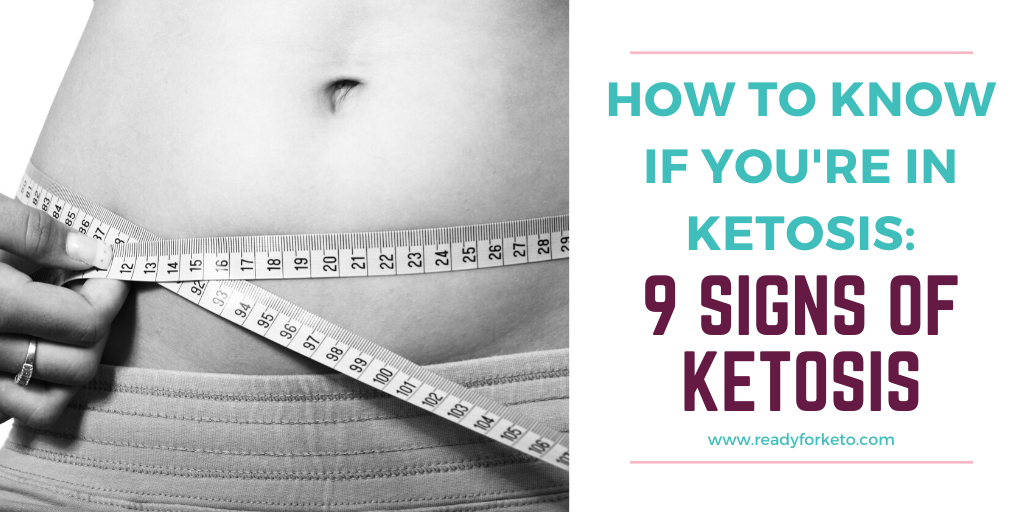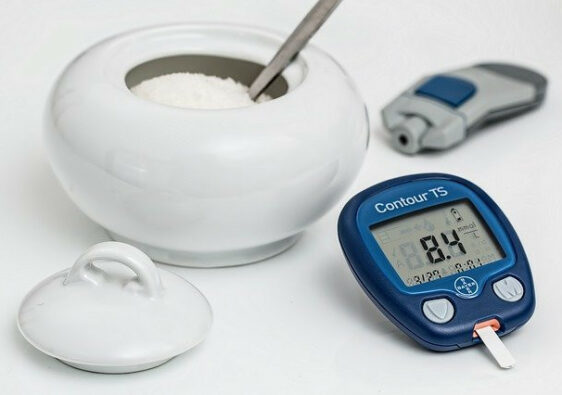Am I in ketosis? This question is certainly asked by all those who start the keto diet. Today I will show you 9 signs of ketosis for you to know for sure if you are in ketosis.

I can tell you one thing in advance! If you are in ketosis, you will feel like a new person! When you have made it and are keto adapted, your body will use your fat as fuel and you will now feel not only more energy but also a longer lasting energy. Of course, you will also notice a difference on the scale, but it is so great that many health benefits come with being in ketosis.
However, before you reach the state of ketosis, you must first boost your metabolism.
At the point when you are not consuming any carbs, your body goes into a state called “ketosis”. Rather than using carbs for energy, fats in the liver are broken down to create ketones, which is instead used as fuel for the body and brain.
In short, being in ketosis means that you are on the right path to losing weight and feeling better. But, how can you notice if you’ve reached ketosis?. I will show you 9 signs that will tell you whether you are in ketosis or not!
The 9 Most Common Keto Symptoms
Keto Flu
Ever heard of the keto flu? Don’t worry, it’s nothing like the regular flu.
The keto flu can occur within the first week of a keto diet – but does not have to.
It is a consequence of the changes your body experiences when entering ketosis, which occurs at the beginning of the keto diet. Fatigue here can be extreme. But it can also be a consequence of the body when the metabolism changes to ketosis. Don’t panic, the tiredness doesn’t last long and after a short time you will feel energetic like never before. Promised.
The solution: Drinking water with a little salt or a delicious bone broth will help you.
Keto Breath
People often report bad breath when they have reached a state of ketosis. Some describe it as fruity smelling or a little biting. This usually disappears after a few days and does not come back when you stay in ketosis for a longer time.
Bad breath is a common side effect of ketosis. Many people who eat a ketogenic diet (less than 20-30g of carbohydrates per day) report that their breath takes on a fruity smell.
This is caused by an increased ketone level. The reason for this is acetone, a ketone body that is excreted from your body in your urine and breath.
Your body makes three types of ketones with a ketogenic diet.
- Acetoacetate
- Beta-hydroxybutyrate (BHB)
- Acetone
Of these 3 types of ketones, acetone is a by-product of the other two. Your body removes acetone mainly through urine and the lungs. So, bad breath does not necessarily mean that there is a lack of good hygiene! Bad breath is unpleasant at first, but it is a good sign that you are in ketosis.
The solution: You can use sugar-free chewing gum, brush and floss your teeth more often, or chew parsley.
If you use chewing gum or other alternatives such as sugar-free drinks, check the ingredients list for carbohydrates. Otherwise, they might raise your blood sugar level and make you lose your ketosis.
Weight Loss
A ketogenic diet and other low carbohydrate diets are very effective for losing weight.
As dozens of weight loss studies have shown, you are likely to lose weight in both the short and long term if you switch to a ketogenic diet.

During the first week of your ketogenic diet, you will most likely experience rapid weight loss. A fast weight loss is a sure sign that you are in ketosis. However, unfortunately it is not fat loss, it is primarily the loss of water and stored carbohydrates that your body gets rid of. This is due to glycogen depletion and electrolyte imbalance. Our body stores glucose in the form of glycogen in our liver and muscles. When carbohydrates are reduced, our body converts the stored glycogen. This is great, then our body directly attacks our fat cells. But it also means that we lose a lot of water, because glycogen molecules consist of three to four parts water. And that in turn causes us to lose electrolytes.
After the initial rapid loss of water weight, you will continue to consistently lose body fat as long as you stick to the keto diet and stay in a calorie deficit.
If you start a ketogenic diet and severely limit the carbohydrates in your diet, you will usually experience rapid weight loss. Weight loss in the first week is a sign that you are in ketosis.
The solution: drink water containing sodium and generally drink a lot, because sodium is salt. Broth and salt help stabilize the electrolyte balance.
Less Appetite
Many people report a lower feeling of hunger during the first week of a ketogenic diet.
The reasons for this are not yet clearly proven.
However, it is believed that the reduction in hunger is due to increased protein and vegetable intake via the ketogenic foods and changes in the body’s own hunger hormones.
The ketone bodies themselves can also have positive effects on the brain to reduce appetite.
A ketogenic diet can significantly reduce appetite and hunger. When you feel full and do not have to eat as often as before, you can almost be sure that you are in ketosis.
Insomnia
For many people on Keto, especially when changing your diet for the first time, sleep takes on a whole new meaning.
Many people report insomnia or wake up more often during the night when they drastically reduce their carbohydrate intake for the first time.

However, these short-term sleep disorders usually improve within a few weeks.
Most of the time, sleep improves after adapting to the keto diet and sleep better than before and wake up much more rested. Ketosis actually increases our energy balance. It just happens that you feel a little restless in the beginning. The longer you are in ketosis, the more regulated it becomes.
The solution: coffee only in the morning, otherwise avoid caffeine during the day.
Increased Focus and Energy
While fatigue and low energy is one of the first signs of ketosis, it is often followed by a real energy boost. Ketone bodies and fat are a much more efficient source of fuel than carbohydrates and provide sustained energy.
Some people report fatigue and nausea when they first start a very low carbohydrate diet.
This is known as “low-carb flu” or “keto flu”. But this only occurs in the first days of a ketogenic diet. In the long term, however, a keto diet causes all people to have a heightened focus and increased energy.
If you start with a low-carbohydrate diet, your body has to get used to burning more fat instead of carbohydrates.
When you are in ketosis, your brain starts burning ketone bodies instead of glucose. It may take a few days or sometimes even weeks before this process begins.
Ketones are an extremely powerful energy source for the human brain – it has been proven that our brain can use ketones as an energy source many times better than carbohydrates! They have even been tested in a medical environment for the treatment of brain diseases and concussion as well as memory loss.
It is therefore not surprising that increased clarity and improved brain function are often reported when following a ketogenic diet.
Carbohydrate elimination can also help control and stabilize blood glucose levels. This can further increase focus and improve brain function.
Digestive Disorders
A ketogenic diet means a big change for your digestive system. The ketogenic foods you eat now are different from your previous diet.
Digestive problems like constipation and diarrhea are initially quite common side effects of ketosis.

Most of these symptoms should subside after the transition period. However, it can’t hurt to be aware of which foods can cause digestive problems.
(Get your free Keto Diet Food List now before you start your ketogenic diet! Download a free PDF with all the important ketogenic foods, so you have a complete overview of all the foods you can eat and which you must avoid to get ketosis. Find out more here!)
The solution: You should also eat lots of healthy, low carbohydrate vegetables. These foods are low in carbohydrates, but still contain plenty of fiber.
Ketones in Urine, Breath, or Blood
One way to check the ketone bodies in your urine every day using special indicator strips.
These measure the amount of ketone excreted in your urine and can be a quick and inexpensive way to assess your ketone levels on a daily basis. However, they are not considered very reliable, but can give an indication of whether you are in ketosis, especially in the first week.
Another way to measure the ketone level is a breath analysis.
A ketone measurement via your breath measures the acetone, one of the three main ketones present in your blood during ketosis.
This will help you get a quick overview of your body’s ketone levels, since during the first phase of ketosis, acetone in particular is excreted from the body and breath.
The use of acetone breath analyzers has been shown to be fairly accurate, but less accurate than the blood analysis method.
One of the main benefits of a ketogenic diet is a reduction in blood sugar levels and an increase in ketones in the blood.
As the duration of a ketogenic diet increases, your body begins to use fat and ketone bodies as a source of energy.
The most reliable and accurate way to measure ketosis is to measure your blood ketone level with a specialized meter.
It measures your ketone level by calculating the amount of beta-hydroxybutyric acid (BHB) in your blood.
Beta-hydroxybutyric acid is one of the primary ketone bodies in the bloodstream during ketosis.
According to some ketogenic nutrition experts, ketosis is defined in the range of 0.5-3.0 mmol/L.
Measuring ketones in the blood is the most accurate way to measure ketosis. This measurement method is used in most research studies. However, the main disadvantage is that it requires a small prick in the finger to extract a drop of blood.
A test kit costs about $50 and an additional $1 for the test strips per test. For this reason, most people only do one test a week or every two weeks.
Click Here & Save 15% on your Keto-Mojo Blood Ketone & Glucose Monitor Kit!
For more information about measuring ketosis, check out this post.
No Hunger Attacks
Everyone knows it – ravenous hunger pangs. When you’re in ketosis, you won’t have those sudden cravings for chocolate, chips or cookies.
There are several reasons for this:
- You consume more fat
- The number of ketones increases
- Blood sugar remains constant
Fat is not evil, but now in combination with carbohydrates is bad. Fat contains twice as many calories as protein and carbohydrates, which of course makes you very full. In addition, our body digests fat much more slowly than other nutrients, which lasts longer and therefore does not cause ravenous appetite attacks.
The falling blood sugar level also affects your hunger hormone. As soon as your blood sugar level is stable, YOU too have more control over your hunger and are no longer driven by your cravings.
Short-term Performance Losses
As already mentioned above, doing without carbohydrates can initially lead to general fatigue. This also includes an initial decrease in training performance.
This loss of performance is primarily caused by a reduction in your muscles’ glycogen stores, which are the most important and efficient source of fuel for all forms of high-intensity exercise.
After a few weeks of ketogenic nutrition, your performance will quickly return to normal. For certain types of endurance sports, a ketogenic diet may indeed be beneficial for performance.
There are several other benefits, most notably increased fat burning during exercise.
A famous study found that athletes who switched to a ketogenic diet burned up to 230% more fat during training compared to athletes who did not follow a ketogenic diet.
While it is unlikely that a ketogenic diet can maximize the performance of elite athletes, once your body has made the transition to using fat as an energy source, it should be sufficient for general sports and recreational activities.
Conclusion
As you can see, there are several signs and symptoms to easily tell if you are in ketosis.
Not to mention… if you follow the rules of a ketogenic diet and stick to them consistently, you will inevitably be in some form of ketosis.
If you want to know for sure and want an exact method of measurement, check the ketone levels in your blood, urine or breath weekly.
However, if you find that you are losing weight, enjoying your ketogenic diet, and feeling healthier, then there is really no need to worry about your ketone levels!
Thanks for reading!
Anna
www.readyforketo.com




